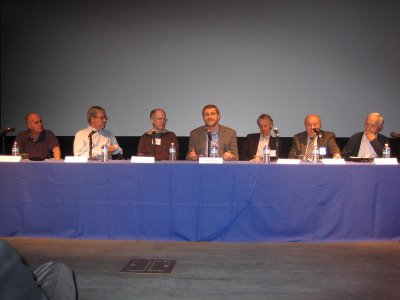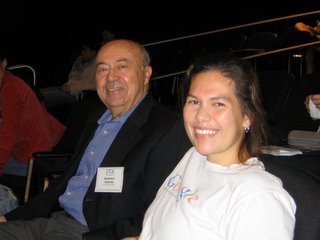Information Theory & Applications Inaugural Workshop at UCSD
Panel discussion: Robert Calderbank, Dave Forney, Michael Luby, Pavel Pevzner, Martin Vetterli, Andrew Viterbi, and Jacob Ziv.

Unfortunately, most of this discussion by premier information theorists was over my head. Robert Calderbank, the moderator, started off by asking the rest of the panel what the greatest triumphs and failures of the information theory field have been. Some were unsure that the field has advanced since Shannon. There was much discussion of CS and ECE topics, including the educational systems. One of them said that everybody should study physics as an undergrad. Physics gives you problem solving skills that every interdisciplinary team of scientists needs. Bioinformatics only came up when they discussed the future of information theory. Jacob Ziv said that biologists pretending to be bioinformaticians do not realize that all the technological tools they want have already been developed by the CS and ECE types, but they just don't know how to use them.
Pavel Pevzner expressed qualms about systems biology. He said that he still does not really understand what it is. He continued to say that he thought for a long time this was due to his own intellectual shortcomings, but then some other famous guy published a paper or review titled, "What is systems biology?" and then he felt relieved that he wasn't the only one. He also said that mathematicians frequently struggle with the motivation of their research, because they are working on problems that are interesting to them but may have no practical value to anyone else. So then Jacob Ziv said you just have to work on whatever you get a kick out of and hope that it will lead to something useful.
Andrew Viterbi said that any fame and accomplishments he has are only due to being in the right place at the right time.
What I took away from this conference was that to do real, applied bioinformatics, it is not enough to be a biologist writing shell scripts or a computer scientist trying to pipet or (even worse) working with data scrounged off somebody in the wet lab. You have to have a real command of both fields. When you generate your own data in the wet lab, you know how reliable they are and where the noise comes from, and you can design a more effective algorithm accordingly.
Also, before one of the talks I was shocked to see Andrew Viterbi sitting in my row, so I asked to take a picture with him. !!!!!!!



1 Comments:
http://virtuagirl.sologirlcenter.com
http://www.virtuagirlbabes.com/g.htm
http://www.1porn.biz/babes.htm
Post a Comment
<< Home